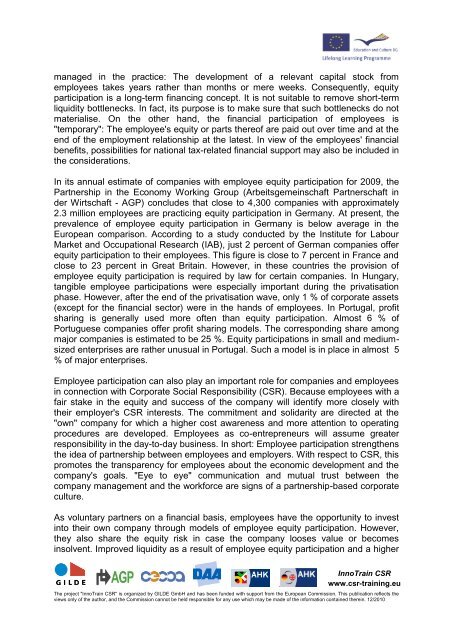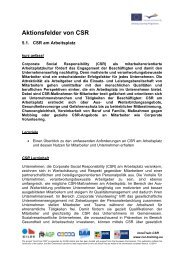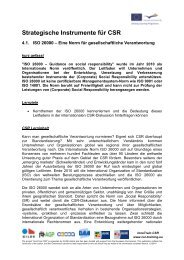What is Corporate Social Responsibility? - InnoTrain CSR
What is Corporate Social Responsibility? - InnoTrain CSR
What is Corporate Social Responsibility? - InnoTrain CSR
Create successful ePaper yourself
Turn your PDF publications into a flip-book with our unique Google optimized e-Paper software.
managed in the practice: The development of a relevant capital stock from<br />
employees takes years rather than months or mere weeks. Consequently, equity<br />
participation <strong>is</strong> a long-term financing concept. It <strong>is</strong> not suitable to remove short-term<br />
liquidity bottlenecks. In fact, its purpose <strong>is</strong> to make sure that such bottlenecks do not<br />
material<strong>is</strong>e. On the other hand, the financial participation of employees <strong>is</strong><br />
"temporary": The employee's equity or parts thereof are paid out over time and at the<br />
end of the employment relationship at the latest. In view of the employees' financial<br />
benefits, possibilities for national tax-related financial support may also be included in<br />
the considerations.<br />
In its annual estimate of companies with employee equity participation for 2009, the<br />
Partnership in the Economy Working Group (Arbeitsgemeinschaft Partnerschaft in<br />
der Wirtschaft - AGP) concludes that close to 4,300 companies with approximately<br />
2.3 million employees are practicing equity participation in Germany. At present, the<br />
prevalence of employee equity participation in Germany <strong>is</strong> below average in the<br />
European compar<strong>is</strong>on. According to a study conducted by the Institute for Labour<br />
Market and Occupational Research (IAB), just 2 percent of German companies offer<br />
equity participation to their employees. Th<strong>is</strong> figure <strong>is</strong> close to 7 percent in France and<br />
close to 23 percent in Great Britain. However, in these countries the prov<strong>is</strong>ion of<br />
employee equity participation <strong>is</strong> required by law for certain companies. In Hungary,<br />
tangible employee participations were especially important during the privat<strong>is</strong>ation<br />
phase. However, after the end of the privat<strong>is</strong>ation wave, only 1 % of corporate assets<br />
(except for the financial sector) were in the hands of employees. In Portugal, profit<br />
sharing <strong>is</strong> generally used more often than equity participation. Almost 6 % of<br />
Portuguese companies offer profit sharing models. The corresponding share among<br />
major companies <strong>is</strong> estimated to be 25 %. Equity participations in small and mediumsized<br />
enterpr<strong>is</strong>es are rather unusual in Portugal. Such a model <strong>is</strong> in place in almost 5<br />
% of major enterpr<strong>is</strong>es.<br />
Employee participation can also play an important role for companies and employees<br />
in connection with <strong>Corporate</strong> <strong>Social</strong> <strong>Responsibility</strong> (<strong>CSR</strong>). Because employees with a<br />
fair stake in the equity and success of the company will identify more closely with<br />
their employer's <strong>CSR</strong> interests. The commitment and solidarity are directed at the<br />
"own" company for which a higher cost awareness and more attention to operating<br />
procedures are developed. Employees as co-entrepreneurs will assume greater<br />
responsibility in the day-to-day business. In short: Employee participation strengthens<br />
the idea of partnership between employees and employers. With respect to <strong>CSR</strong>, th<strong>is</strong><br />
promotes the transparency for employees about the economic development and the<br />
company's goals. "Eye to eye" communication and mutual trust between the<br />
company management and the workforce are signs of a partnership-based corporate<br />
culture.<br />
As voluntary partners on a financial bas<strong>is</strong>, employees have the opportunity to invest<br />
into their own company through models of employee equity participation. However,<br />
they also share the equity r<strong>is</strong>k in case the company looses value or becomes<br />
insolvent. Improved liquidity as a result of employee equity participation and a higher<br />
The project "<strong>InnoTrain</strong> <strong>CSR</strong>" <strong>is</strong> organized by GILDE GmbH and has been funded with support from the European Comm<strong>is</strong>sion. Th<strong>is</strong> publication reflects the<br />
views only of the author, and the Comm<strong>is</strong>sion cannot be held responsible for any use which may be made of the information contained therein. 12/2010<br />
,<br />
<strong>InnoTrain</strong> <strong>CSR</strong><br />
www.csr-training.eu





